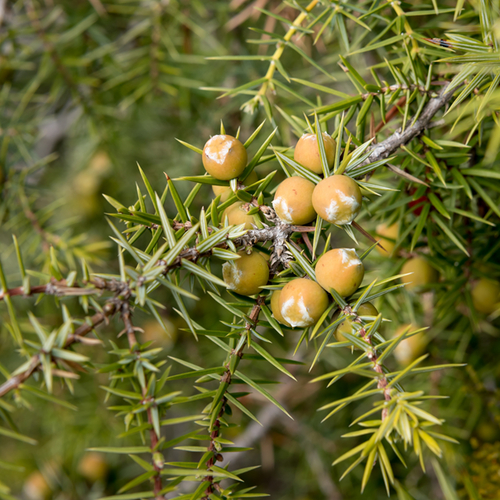
Cade
Scientific names: Juniperus oxycedrus
Family: Cupressaceae
Alternate names: Alquitran de Enebro, Cada, Cade Essential Oil, Cade Juniper, Cade Leaf, Cade Oil, Cade Stem, Cade Wood, Cade Wood Essential Oil, Cade Wood Oil, Common Juniper, Essence de Cade, Feuille de Cade, Genévrier Cade, Genévrier Epineux, Genévrier Oxycèdre, Goudron de Cade, Huile de Cade, Huile Essentielle de Cade, Juniper Tar, Juniper Tar Oil, Kade, Kadeoel, Kade Oil, Oil of Cade, Oil of Juniper Tar, Oleum Cadinum, Oleum Juniperi Empyreumaticum, Oxycèdre, Pix Cadi, Pix Juniper, Pix Oxycedri, Plum Juniper, Prickly Cedar, Prickly Juniper, Pyroleum Juniperi, Pyroleum Oxycedri, Rectified Cade Oil, Red-Berry Juniper, Sharp Cedar, Wacholderteer
Background
Cade is a plant. The leaf, berries, stem, and oil extracted from the wood are used for medicine. The oil is also commonly used as a fragrance in perfumes, skin creams, and other products.
Cade oil is taken by mouth or applied to the skin for many different conditions, but there is no good scientific evidence to support these uses. Using cade can also be unsafe.
Cade oil is taken by mouth or applied to the skin for many different conditions, but there is no good scientific evidence to support these uses. Using cade can also be unsafe.
Safety Safety definitions
When taken by mouth: Fully processed cade oil ("rectified cade oil") is POSSIBLY UNSAFE. It irritates the lining of the mouth and can cause serious side effects such as breathing problems, organ failure, seizures, and coma. Cade oil that has not been fully processed to remove cancer-causing compounds is LIKELY UNSAFE. Avoid using any form of cade oil by mouth.
When applied to the skin: Fully processed cade oil ("rectified cade oil") is LIKELY SAFE when applied to the skin in preparations containing 1% to 5% of the oil. These products seem to be safe to use short-term for minor skin problems. But cade oil that has not been fully processed to remove cancer-causing compounds is LIKELY UNSAFE to apply to the skin. Avoid using it.
There isn't enough reliable information to know if taking cade berries or leaf extracts is safe or what the side effects might be.
Children: Any preparations containing cade oil are LIKELY UNSAFE for children, either taken by mouth or when applied to the skin. Children seem to be at higher risk for serious, even deadly reactions to cade oil.
Cypress allergy: Pollen from cade trees can cause allergic reactions in people with cypress allergies.
When applied to the skin: Fully processed cade oil ("rectified cade oil") is LIKELY SAFE when applied to the skin in preparations containing 1% to 5% of the oil. These products seem to be safe to use short-term for minor skin problems. But cade oil that has not been fully processed to remove cancer-causing compounds is LIKELY UNSAFE to apply to the skin. Avoid using it.
There isn't enough reliable information to know if taking cade berries or leaf extracts is safe or what the side effects might be.
Special Precautions & Warnings:
Pregnancy and breast-feeding: There isn't enough reliable information to know if cade is safe to use when pregnant or breast-feeding. Stay on the safe side and avoid use.Children: Any preparations containing cade oil are LIKELY UNSAFE for children, either taken by mouth or when applied to the skin. Children seem to be at higher risk for serious, even deadly reactions to cade oil.
Cypress allergy: Pollen from cade trees can cause allergic reactions in people with cypress allergies.
Effectiveness
NatMed Pro rates effectiveness based on scientific evidence according to the following scale: Effective, Likely Effective, Possibly Effective, Possibly Ineffective, Likely Ineffective, Ineffective, and Insufficient Evidence to Rate.
Insufficient evidence Effectiveness definitions
- Diabetes.
- Diarrhea.
- Peptic ulcer disease (PUD).
- High blood pressure.
- Lung infections.
- Common cold.
- Kidney stones.
- Cancer.
- Psoriasis.
- Eczema.
- Scabies.
- Wounds.
- Head lice.
- Dandruff.
- Hair loss.
- Cancers.
- Snake bites.
- Other conditions.
Dosing & administration
The appropriate dose of cade depends on several factors such as the user's age, health, and several other conditions. At this time there is not enough scientific information to determine an appropriate range of doses for cade. Keep in mind that natural products are not always necessarily safe and dosages can be important. Be sure to follow relevant directions on product labels and consult your pharmacist or physician or other healthcare professional before using.
Interactions with pharmaceuticals
It is not known if Cade interacts with any medicines. Before taking Cade, talk with your healthcare professional if you take any medications.
Interactions with herbs & supplements
There are no known interactions with herbs and supplements.
Interactions with foods
There are no known interactions with foods.
Action
Some studies in the lab show that cade extracts can kill bacteria, decrease swelling (inflammation), and improve blood sugar levels. There isn't enough information to know if cade has these effects in people.
vital.ly has licensed monographs from TRC Healthcare.
This monograph was last reviewed on 22/02/2023 11:00:00 and last updated on 23/11/2020 21:29:33. Monographs are reviewed and/or updated multiple times per month and at least once per year.
Natural Medicines disclaims any responsibility related to medical consequences of using any medical product. Effort is made to ensure that the information contained in this monograph is accurate at the time it was published. Consumers and medical professionals who consult this monograph are cautioned that any medical or product related decision is the sole responsibility of the consumer and/or the health care professional. A legal License Agreement sets limitations on downloading, storing, or printing content from this Database. No reproduction of this monograph or any content from this Database is permitted without written permission from the publisher. It is unlawful to download, store, or distribute content from this site.




